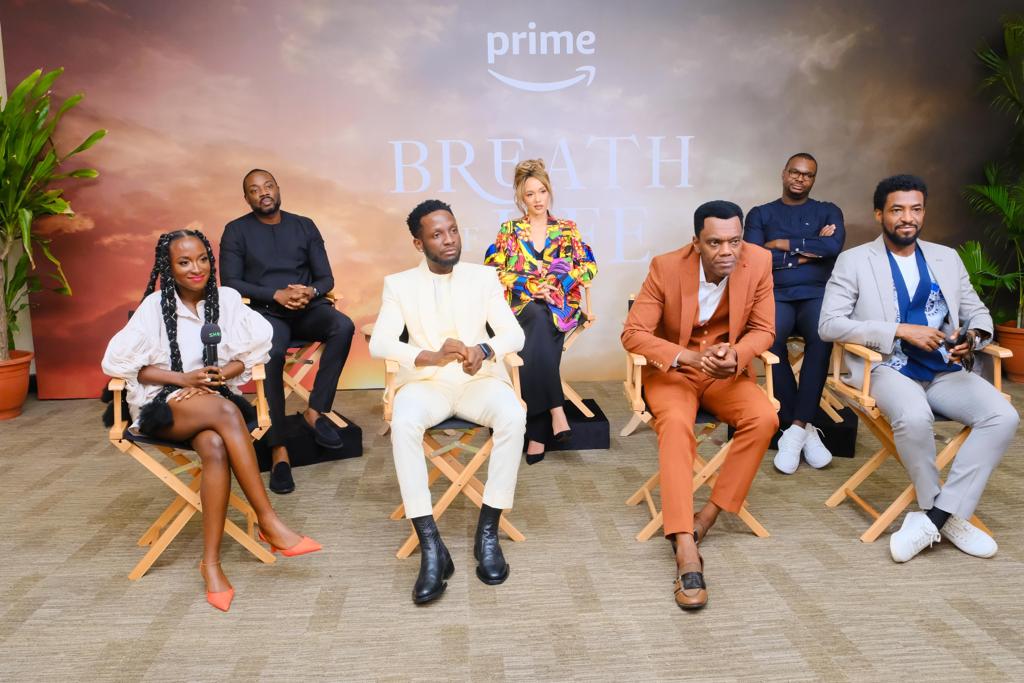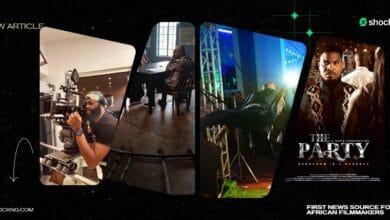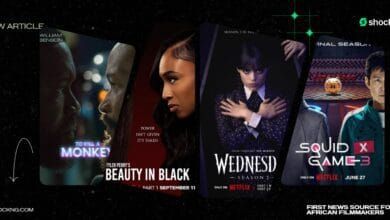The Story⚡
Dedication, desire, doggedness; the journey towards Breath of Life
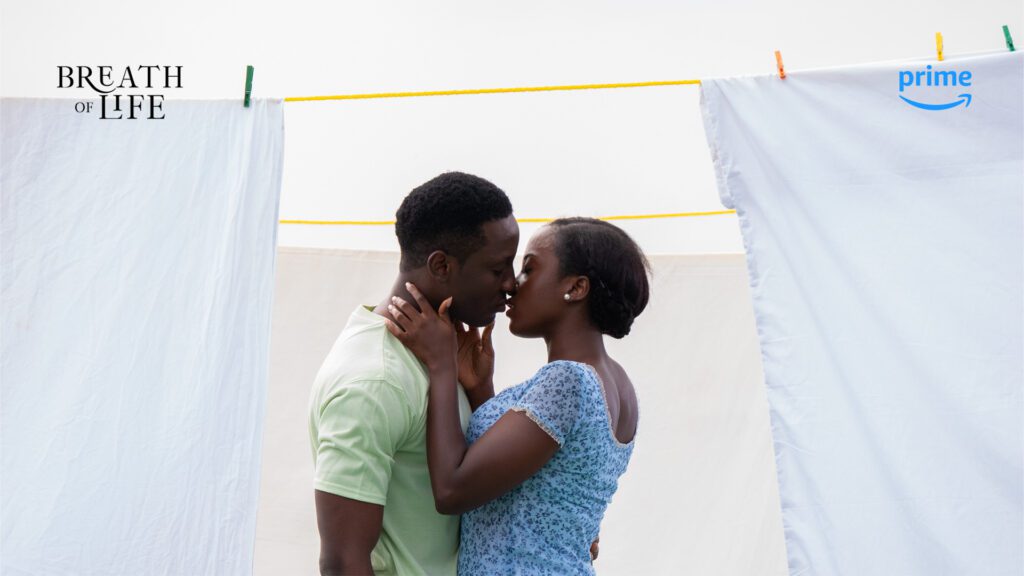
Tell Me More
Breath of Life is a 2023 released Nigerian drama written and directed by BB Sasore and produced by Eku Edewor. Released on November 15 as a Prime Video original film, the film follows the story of Timi who loses his sense of purpose until he meets Elijah who changes his life and destiny.
The cast and crew of Breath of Life sit with Shock in this exclusive to discuss the unique, nostalgic, and adventurous journey to this stirring story.
What conversation did you have with the Director to bring Anna to life?
Genovevah: With BB we talked over FaceTime, I asked him a very personal question because there’s a line in the film that says “I don’t really do the God thing”.
And I asked why, then suggested that, is it because her parents are affluent and they just believe in doing it themselves. That was a conversation that happened amongst other conversations. The good thing was that BB was receptive to my ideas as well as my co-star. One thing that stood out for me with Anna is that although she is supportive of her community and of Elijah’s dreams, she’s also somebody who is finding what applies to her and her purpose.
The most important is that she is from an affluent home, but she’s a rebel, and she’s confident enough to challenge what is within her community.
I enjoyed that. And BB was helpful with that process for me.
Was there any part of the film that was improvs?
Chimezie: We had lots of improvs, especially since Genovevah and I night before the shoot would discuss and prepare for the scenes we had for the next day, we would also watch different films.
We did that almost every night and sometimes we would do a scene and BB would go, “This is not how I planned it, but it kind of works”
BB SASORE: As far as improv with him in particular, all the physical comedy, he sort of improv that.
In the scene in the church when she says, “Walk me home”, he runs back and just falls by the chair.
He didn’t tell me he was going to do that.
He just goes back to get his Bible and just makes himself slip and fall.
So I find that with actors, they have things that they’re very good at. They already know they’re very good at it. You don’t want to dull those senses. You just don’t want it to overwhelm the character.
I’m glad I worked on a bunch of stuff like that he’s so good at, but everything physical comedy in the film was pretty much improv. And then the two of them, I will say that the chemistry was there.
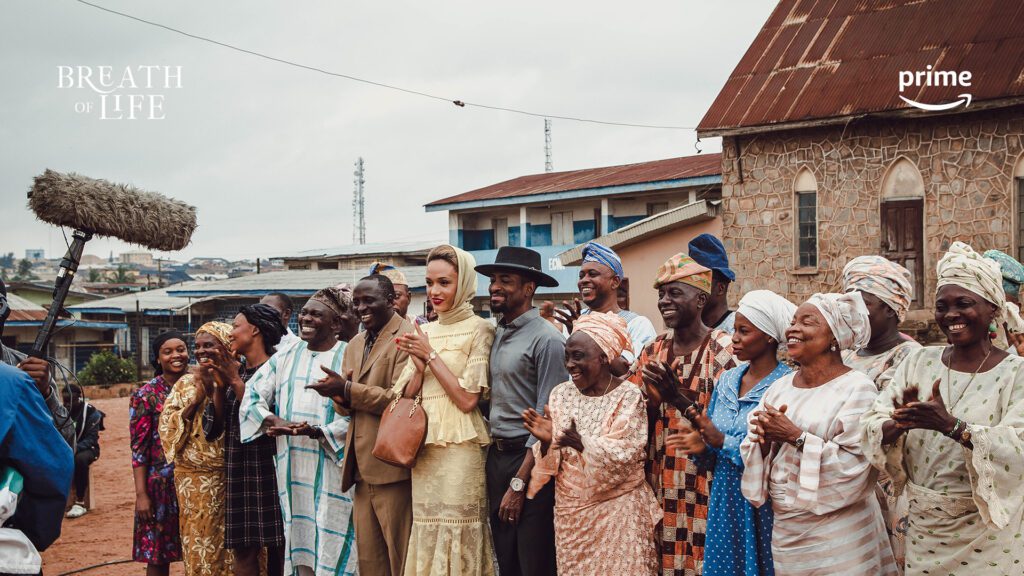
When the team watched this film during AFRIFF, the first general comment was –
“This is the best of Wale Ojo in a leading role”. Why did you think your acting came out well in this feature..is it the directing?
Wale Ojo: I think every director has a different approach to how to work with actors. And some directors can get intimidated by the fact that I’ve been doing it for a while and I have some kind of history behind it.
But what they don’t know is that my approach to acting is whatever job you get is always like the first job. That’s the way to approach it and that’s what I did with this.
You allow yourself to be a vessel that’s carried by the director. And because actors are very smart, if we sense a director is not pushing as much as they can, we’ll just do the minimum.
And I think BB kind of senses that you when you’re slacking and pushes you to have another go.
I think by the time you’re doing that one more time, you realize that you may have missed out on something then you get inspired to do it again and you can find yourself even working for another 2 or 3 hours.
You did phenomenal in this, especially as the emotional anchor of the story. How did you get deep into this character to deliver?
Demola: Getting into this film was like a bit of a psychological race for me.
I told myself, okay, get ready. Go.
So each scene was like something was just happening, and building. I can’t pick one particular scene that I can say stood out The most interesting thing about it to me is the different flavours and the different contours of the character that gives you different essences of his journey. It’s a deep psychological journey.
The man is crazy because he’s in a very crazy place.
He doesn’t shave, he doesn’t even brush his teeth. If you greet him, he will just grunt.
And I had to do that a lot where even where I was staying in Ibadan, I wasn’t greeting people to get into the psyche of this guy. I still feel like I could have even gotten more into the pain of the character, like showing the emotional pain of this character on screen.
I also felt the death of the baby’s fire was not enough, but the director was very clear on the fact that he didn’t want it to be an action movie, he didn’t want all that John Wick type of thing.
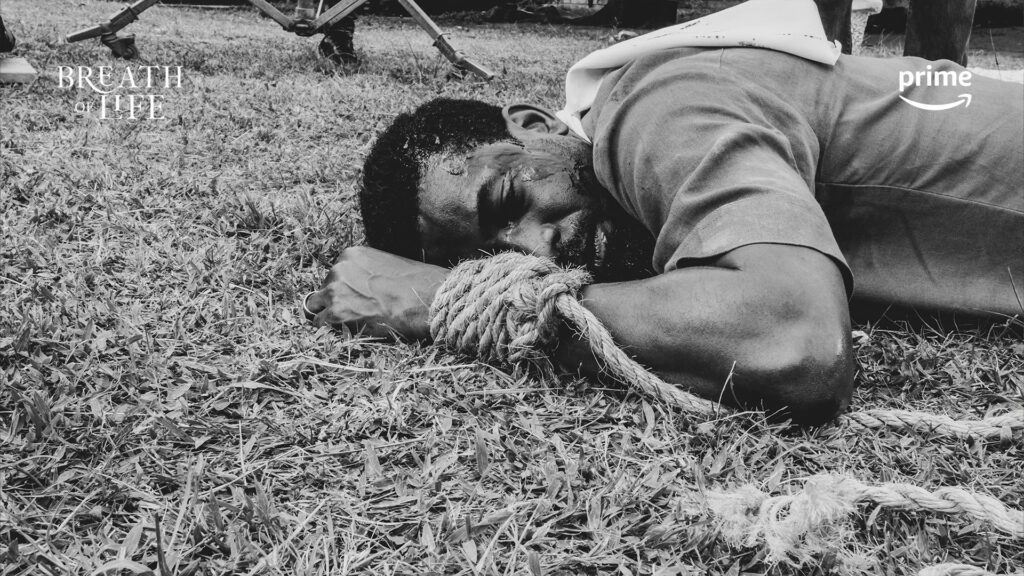
The Monologue scene was brilliant. Tell me what you realised at this moment?
Wale Ojo: He never left God.
In his conscious mind. Yes, subconsciously, no.
Even when he meets Elijah in the church, he’s quoting the Bible. So he’s having this constant conversation with God and with himself, whereas what he doesn’t know is that there’s a bigger divine plan.
So when it builds up into that church scene where he’s all alone, he finally realizes.
Why did you say yes to this psychologically draining character and the one unique experience with the Director?
Demola: For me, the whole thing, the whole story, the ambition. That’s a very big part of it. When people are trying to do things that are massive like that. In the context of our environment, the project ambition was very magnetic to me.
Working with BB was an experience, I keep thinking, this guy must have experienced ego death at some point in his life because there are some directors you work with that as soon as you come on to the set, they’re telling you exactly second for second what they want you to do, explaining everything they want you to do this.
They want the lines to be perfect, no improv. BB tends to get out of your way, he lets you do your thing. He doesn’t try to control your act.
I felt the death scene of the baby fire wasn’t enough..was this the original plan?
Eku: We had one original script and it was going to be blood splattering everywhere, a real bloody mess. We thought it was too much.
And also, VFX is very hard in this country, getting it right and then having to do all that., I think there was a discussion about Timi’s character and he would be that psychotic.
It just didn’t work out that way.
Making One Feel Purpose on Screen via a Nollywood film is hard. How did you achieve that?
BB Sasore: Film is the only profession that I know in the world that you cannot do by yourself.
The collaborative power of it truly is why you can answer that question because to get to every answer, a bunch of people have to be involved in that conversation. Look at us talking about, you know, to do an axe versus to do a gun. So I think the format lends itself to collaboration well.
We have a mantra that we don’t hire people we can afford. Fundamentally you have to be better than what we can pay. And the point of that is everybody’s going to bring their own best stuff.
I guess the long, protracted answer is to say – “To answer questions that deep like true purpose, We don’t answer it. We just get you to ask yourself – what is your purpose and what relationships help that purpose?”
I think it takes a village. I don’t think it takes a person or a person’s mind and logic to do it for the screen.
Why does the project make use of cinematic landscape shots?
BB Sasore: I think a lot of the really good directors in Nollywood know it’s all cheat code for us because we know the things we can’t achieve. I know that, yeah, we’re good at VFX, but we can’t replace every scene.
So when we’re talking about the house, the house is probably the biggest decision that we made. It took forever. We build sets inside the house, and we have the texture of the old concrete and certain panels of wood and things like that but for the exterior, I knew we wanted breathtaking shots.
And so we just went and looked for really nice landscapes. What was difficult about it that most people don’t realize is we shoot almost exclusively against that landscape. But then you have such great performances people don’t recognize.
So there’s an intentionality to everything trying to look spectacular because we don’t have the budgets to sort of pull off spectacular things but the little bits that we have, we’ll make sure that we do well.
I have learned that the best way is hopefully you get the writing part done well. Hopefully, your pre-production by the team is done well, and then you turn on the camera and you get out of their way.
They’re going to bring magic.

There is a scene that mentions how colonialism is the bane of baby fire’s protection, how did that come by?
BB Sasore: I think where we are in the world today, race relations race relations is sort of bubbling up to the top. We live in a global village, people are talking Detty December, they are coming back to Nigeria. There’s always your Ancestry.com. And I think some of the things we do share is the idea that wherever you are, whatever time period you live in, there’s someone pulling the string. And I did feel like many times we forget that.
I’m fascinated not just by purpose in life and God, but I’m fascinated by how much brainwashing there is. I’m fascinated about it, now I’m rocking Jordan with my traditional wear and I love that, but how much of it is my choice?
How much of it is because I’ve been told this is cool. I just don’t know if we talk about how much of it is a sort of mentality we’ve been given.
How did you audition for this role?
Chimezie: I was leaving everything in the taxi and I told God, I want one birthday present from you, I want Elijah. Three months later BB called me, it took me about 20 minutes to remember I auditioned for the role. Then he says I want you to come for a screen test with all the other characters.
So I was expecting to see other Elijah’s. I get to set and I see I’m the only Elijah with 9 other Annas. That’s how I knew how I got the role.
Run me through your process of preparing for Anna in Breath of Life
Genoveva: Usually, when I read a script, I like to take notes of whatever comes into my head at the moment, instantly take notes because then it helps me to build the character. My first instincts usually guide me. I then went on to speak to BB Sasore who answered some really interesting questions that I had.
Then I go back and then I read, make annotations or prep a scene. I also do this thing where I reach out to the actors that I know are going to be working on this project because it’s important that I form a connection and I make them feel comfortable and make them know I’m excited to be working with them on this. I think that brings a sense of being at home and feeling safe and feeling excited.
I had this playlist for Anna. And it had these songs from the Beatles and Emily Sandy, ‘’That’s When You Feel My Kind of Love’’.And I’d play that over and over again on set coupled with ‘Oruka’ by Sunny Nneji, and ‘Olufunmi’ by Styleplus.
We also watched the rom-com film Notting Hill.
There’s 70% of doing the work, 30% is like being on the scene and having fun. I think that’s my process in a little nutshell.
How do you feel about being a part of Breath of Life as the first Prime original commissioned film?
Chimezie: Honestly, when I heard I was going to be in this film and I knew how big it was going to be, I didn’t think about how big it was going to get.
I just wanted to be Elijah because I know how it can get into one’s head and you lose being the character and you just start to perform nonsense.
So I did not think about, how big it’s going to be. I just want it to be this character at this point.
But right now, sitting here with you and thinking about it, it’s a humbling feeling for me. I feel blessed. I am happy and it humbles me because it tells me that I have lots of work to do. As actors, we are as good as our last job. So I’m here, sitting here and imagining what I have to do next. I think one can strive for excellence when you know there’s still a lot of work for you to do, there’s more you can do, and that’s how I feel.
How did you Audition for Anna?
Genoveva: So I get an email and there’s like nine people on the email list and I find out what time I’m coming in for this audition. And I’m like, there’s like nine females here, nine talented females.
What’s going on?
I remember the night before just thinking -this scene is so nuanced. I just really enjoyed the rise and fall and the scene that we did was the scene where Anna confronts Mr. Timi, and I remember feeling like I want to be Anna.
I want to feel like I’m confronting Mr. Timi. So I practised and then I also thought to myself, yeah, I’m just going to go for it.
Now my approach to auditions is to just have fun and to surprise myself.
And that’s what I think about when I go into the room. And those were my thoughts. I did that, and then I got a callback.
Chimezie: I got an email to come for an audition. I didn’t know it was Breath of Life neither did I know it was for Prime Video. The audition date was my birthday, so I sent an email saying I would not be able to make it but I would send an audition tape.
I woke up on the 7th of January, my birthday, and I heard a voice that said “Go!”. I showed up and they were surprised to see me because I said I was not going to come. Then I knew BB Sasore but there was no face to the name and I auditioned. I did, I did the audition, I did the part, the confrontational part between me.
What references did you use to build the aesthetic?
Eku Edewor: We had many aesthetic references, we had a lot of film references as well Director BB’s biggest reference for us on the creative side was Downtown Abbey.
And I remember saying to BB that first of all Downtown Abbey has a Downton Abbey budget and secondly, Downton Abbey, I didn’t think was representative of an African mansion.
I felt that we did have mansions like the Chief Salami’s House, which was built in the 30s. And it would be similar in scale to the characters we have because he inherited the house from his dad. So I wanted us to bring a level of believability from the African historical point, the Nigerian historical point, which isn’t a Downtown Abbey mansion.
It’s something a little bit more scaled to our taste. The aesthetics are a bit different, it’s still very much colonial in terms of the wood panelling. And we reflected on the taste of the West, it was to bring that relatability that we’re in a nondescript African town and what would Timi’s father’s mansion be like.
And even I think Chief Salami had the only car at the time when he built his house. He was the only person to own a car. So a lot of that informed me that even the Rolls-Royce that I brought from Delta was my grandfather’s Rolls-Royce.
And I think he was one of the only people in his town at that time in Warri that had a big car. So there were a lot of ideas that I wanted to get across. At one point we discussed shooting in Delta and possibly shooting at my grandfather’s house but we found that Ibadan really lent itself more to the story and also technically as well, convenience, transport, getting there was a lot easier, it was it’s it was easily accessible. We could get that by road.
It’s interesting, my mother’s an interior designer, and the creative director is an architect a lot of my of my mother’s taste fed into the film. In TimI’s dining room, which was one of the core sets of the film, because so much happens in the dining room, blue was a very specific colour.
Blue was important because water was a very strong theme, and bringing that room to life was nostalgic for me. The chandelier was mine from my mom’s first house. The wallpaper was from my mom’s shop, it was it was a British wallpaper that she stored, there were so many things that were personal to me, but I’m personal to the taste that I have.
So I would say that my mother was a great influence in the taste that I had.
What’s the one thing that you were grateful for?
Derin: Well, I’ll say, the people that we got to work with, it made such a hard film worthwhile and easy to do. Between us here, we have great chemistry and we don’t fuss about anything.
We never really had that many big blowouts.
